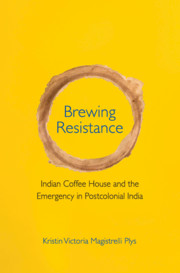Book contents
- Frontmatter
- Contents
- Acknowledgements
- 1 Introduction
- 2 How Anti-Colonial Labour Movements Create Anti-Authoritarian Autonomous Zones
- 3 Indira Gandhi’s Political Economy of Development
- 4 Social Movements of the 1970s
- 5 Emergency at Midnight
- 6 The Coffee House Movement
- 7 ‘Coffee House’ Workers’ Anti-Colonial Labour Movement
- 8 Conclusion
- Appendix I Photographs
- Appendix II Political Parties during the Emergency
- Appendix III Methodological Appendix
- Bibliography
- Index
6 - The Coffee House Movement
Published online by Cambridge University Press: 12 May 2020
- Frontmatter
- Contents
- Acknowledgements
- 1 Introduction
- 2 How Anti-Colonial Labour Movements Create Anti-Authoritarian Autonomous Zones
- 3 Indira Gandhi’s Political Economy of Development
- 4 Social Movements of the 1970s
- 5 Emergency at Midnight
- 6 The Coffee House Movement
- 7 ‘Coffee House’ Workers’ Anti-Colonial Labour Movement
- 8 Conclusion
- Appendix I Photographs
- Appendix II Political Parties during the Emergency
- Appendix III Methodological Appendix
- Bibliography
- Index
Summary
The burden of the night still weighs us down
The eye and heart are still not free
Press on, for the destination is yet to be reached
—Faiz Ahmed Faiz, Subah-e-Azadi (trans. from Urdu)
The major theoretical and political problem of totalitarian rule is that it is difficult to create a mass movement against a totalitarian regime given severe repression of dissent. When totalitarian rule supplants democratic governance, resistance becomes most severely constrained, but also most necessary. In this context, non-violent forms of resistance, epitomised by the tactics of figures such as Mohandas Gandhi or Martin Luther King Jr, are quickly repressed, so opposition movements need to adopt other strategies. In other totalitarian contexts, such as Nazi Germany or Mussolini's Italy, the café became an important resource for movements against the state. First of all, the café was a place to escape the loneliness of life under totalitarian rule (Bronner and Kellner 1982: 97) and allowed people to come together in a public space that was not subject to state surveillance and control (Kohn 2003: 16). In Italy, cooperative cafés were even more suited to the task of fomenting resistance against totalitarian rule in that they are both an economic tactic and sociopolitical space (Kohn 2003: 71). These types of cafés, like the Indian Coffee House at Connaught Place, for example, became autonomous zones that fostered resistance against the totalitarian state.
An autonomous zone is ‘a guerrilla operation which liberates an area (of land, of time, of imagination) and then dissolves itself before the state can crush it’ (Bey 1985: 95). In other words, an autonomous zone creates an area which is separate from state and capital in which revolution and resistance is not only possible but also encouraged. Or as Saul Newman writes,
Rather than seeking to take over state power, or to participate in state institutions at the level of parliamentary politics, many contemporary actors and movements endeavour to create autonomous spaces, social practices and relations, whether through the permanent or temporary occupation of physical spaces—squats, community centres and cooperatives, workplace occupations, mass demonstrations and convergences—or through the experimentation with practices such decentralised decision-making, direct action or even alternative forms of economic exchange which are not striated, conditioned or ‘captured’ by statist and capitalist modes of organisation. (Newman 2011: 345)
- Type
- Chapter
- Information
- Brewing ResistanceIndian Coffee House and the Emergency in Postcolonial India, pp. 170 - 249Publisher: Cambridge University PressPrint publication year: 2020



